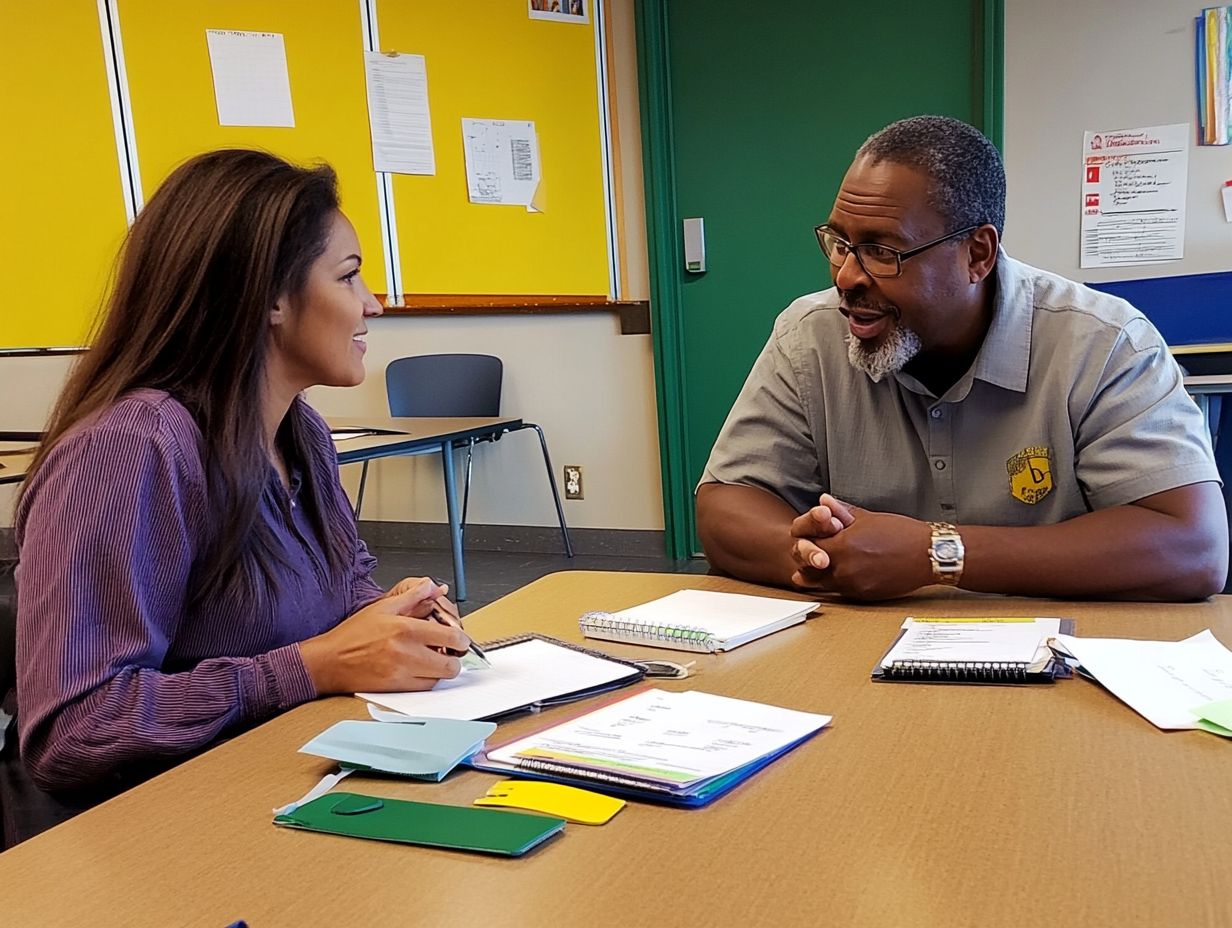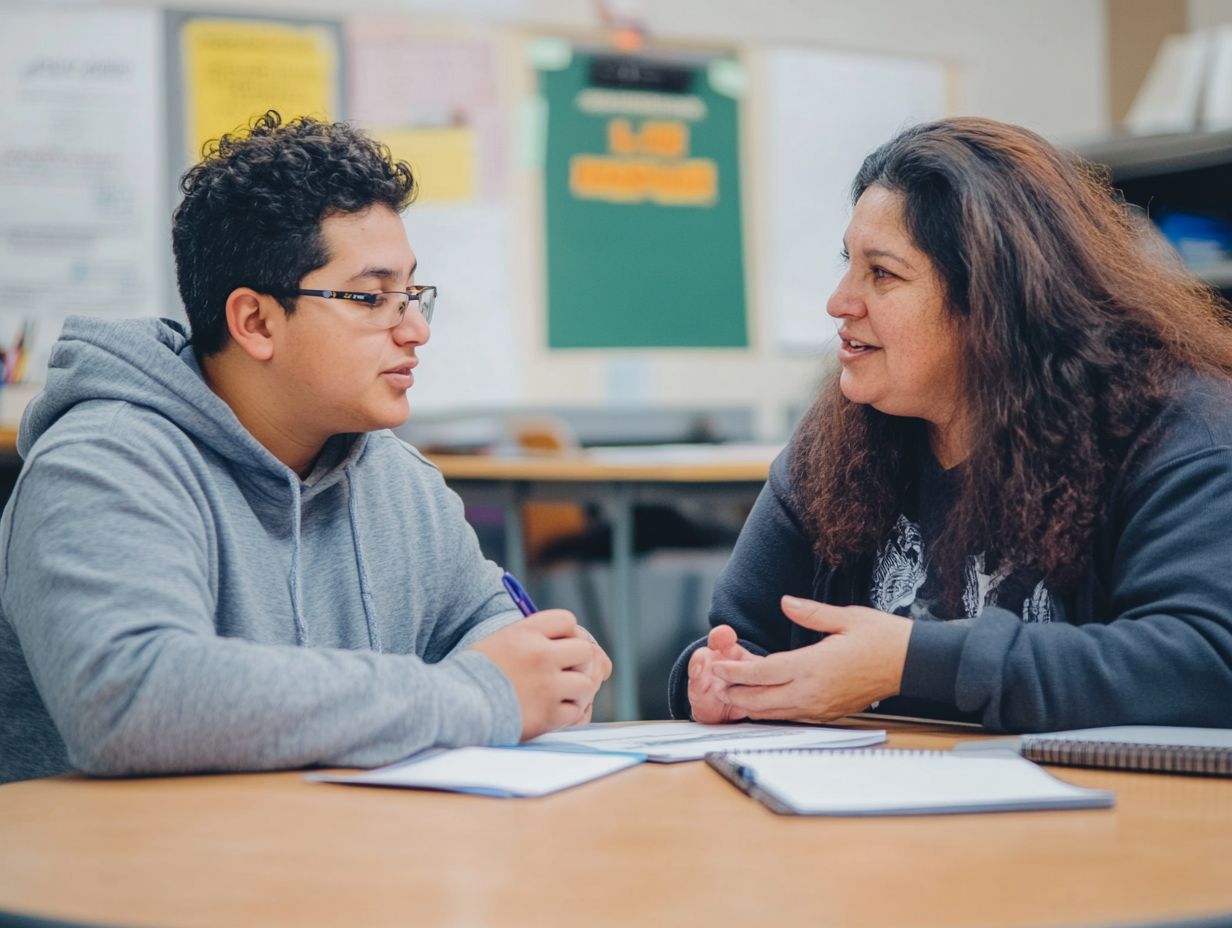How to Navigate Parent-Teacher Meetings
Parent-teacher meetings serve as essential milestones in a child s educational journey, presenting a valuable opportunity for you and educators to collaborate on your child’s academic, social, and emotional development. Let s explore how these vital meetings can empower you to support your child’s growth like never before!
This article delves into the purpose and significance of these gatherings, offering insights into effective preparation strategies, such as reviewing academic work, and what you can expect during the conversation.
Additionally, you ll find tips on maximizing the experience, including conference etiquette and following up afterward to ensure that your child continues to receive the support necessary for their success. Don’t miss this chance to truly understand your child’s needs!
Contents
- Key Takeaways:
- What Are Parent-Teacher Meetings?
- Why Are Parent-Teacher Meetings Important?
- How to Prepare for a Parent-Teacher Meeting?
- What to Expect During a Parent-Teacher Meeting?
- How to Make the Most Out of a Parent-Teacher Meeting or Virtual Conferences?
- What to Do After a Parent-Teacher Meeting?
- Frequently Asked Questions
- Tips for Successful Parent-Teacher Meetings
- How should I prepare for a parent-teacher meeting or virtual conference?
- What should I expect during a parent-teacher meeting?
- How can I build a good relationship with my child’s teacher during a parent-teacher meeting?
- What if I am unable to attend a parent-teacher meeting?
- How often should I attend parent-teacher meetings?
Key Takeaways:

- Prepare for the meeting by reviewing your child’s progress and preparing questions to ask and concerns.
- Be open to feedback and collaborate with the teacher to set goals for your child.
- Follow up on action items, communicate with your child, and stay involved in their education.
What Are Parent-Teacher Meetings?
Parent-teacher meetings, often referred to as parent-teacher conferences, are invaluable occasions that foster meaningful communication between you and your child s educators. These meetings let you talk about your child’s academic performance, classroom behavior, and overall development within the educational setting.
It’s a chance for you to engage with the teacher, share insights about your child’s experiences, and gain a richer understanding of how you can best support their education. These conferences also allow teachers to understand the family context of their students, paving the way for personalized educational strategies that focus on specific challenges while reinforcing individual strengths.
Why Are Parent-Teacher Meetings Important?
Parent-teacher meetings are essential for cultivating a strong partnership between educators and parents, profoundly influencing children s education and overall developmental progress.
These conferences offer teachers the opportunity to share feedback on a student s academic performance and behavior in the classroom. They also give you the chance to voice your insights and concerns about your child’s learning preferences and social-emotional growth. Teachers’ involvement in these discussions is crucial.
By participating in these meetings, you can engage more meaningfully in your child’s educational journey, uncover valuable insights into their strengths and challenges, and enhance their academic progress through specific plans.
How to Prepare for a Parent-Teacher Meeting?
Preparing for a parent-teacher meeting with intention can significantly elevate the quality and outcome of your discussion about your child’s educational journey. To truly maximize the benefits of this conference, begin by reviewing your child’s academic work, as this can illuminate specific areas where they may be struggling or excelling.
Formulating thoughtful questions to pose to the teacher will help ensure that no crucial topics are missed, allowing you to gain valuable insights into your child’s progress, strengths, and challenges. Effective communication with parents is essential in these meetings.
Additionally, managing your time effectively during the meeting can foster more productive discussions and meaningful exchanges, making the most of this important opportunity.
1. Review Your Child’s Academic Progress
Analyzing Academic Records
Reviewing your child s academic progress is essential, as it gives you a well-rounded view of their educational journey and pinpoints areas where they shine or may need additional support. To gain this insight, you should analyze report cards, assignments, and feedback from teachers, creating a clear picture of their academic performance.
Take full advantage of school management systems, which often grant you real-time access to grades and attendance records. This allows for timely interventions when necessary, ensuring that your child receives the support they need right when they need it.
Creating a Supportive Environment
Engaging in conversations with teachers can provide valuable insights that often go beyond what s captured in written reports. A follow-up email can also be beneficial for keeping track of discussed points.
Creating a supportive home environment where academic concerns can be addressed openly will empower your child to take ownership of their learning. Establishing regular check-ins to review their progress and set achievable goals together can serve as a powerful motivator.
Positive reinforcement can also play a crucial role in encouraging continued effort and improvement.
2. Prepare Questions and Concerns
Preparing a list of questions and concerns prior to meeting with the teacher can greatly enhance the quality of your discussion and ensure that all important topics are addressed. You should concentrate on inquiries about your child’s academic performance, the ways to keep your child interested in learning, and any worries regarding specific areas where your child may be facing challenges. This will help in thoroughly discussing the meeting agenda.
This proactive approach showcases your commitment to your child’s education and cultivates a collaborative environment between you and the educators. When you express interest in particular teaching methods and how they align with your child’s learning style, it invites teachers to share valuable insights that can empower you to support your child’s learning at home.
Discussing engagement strategies may unveil new techniques that spark motivation and encourage your child to participate more actively in their education. By seeking input from teachers, you are positioned to make informed decisions that will ultimately enrich your child’s academic journey.
3. Schedule an Appointment

Scheduling an appointment for the parent-teacher meeting is vital for ensuring that you and your child’s teacher can dedicate the necessary time for a meaningful discussion. You should take a moment to consider whether you prefer virtual conferences or in-person meetings, keeping your busy work schedule and availability in mind.
This thoughtful approach will enable you to manage your time effectively and engage fully during the conference. Proper time management is essential in making these meetings productive.
When choosing the format for these discussions, it s crucial to quickly assess what your child needs to succeed! Some subjects may greatly benefit from face-to-face interaction, while others can be efficiently addressed through video calls.
Effective time management becomes crucial as you navigate balancing your personal commitments with your child s educational needs. By carefully examining your schedules and preferences, you enhance the quality of these meetings, ensuring that both you and the educators can address important aspects of your child’s development.
Discussing your child’s experiences at home can also provide valuable context during these meetings. Ultimately, this meticulous planning paves the way for more productive discussions and cultivates a stronger partnership in fostering your child’s success.
Take action now and actively participate in your child’s education to maximize their potential!
What to Expect During a Parent-Teacher Meeting?
At a parent-teacher meeting, you can look forward to a thoughtfully structured yet adaptable environment dedicated to discussing your child s academic progress, classroom behavior, and overall educational development within the school.
Educators come prepared to share detailed information into your child’s performance, highlighting strengths and identifying areas for improvement, all while fostering a respectful dialogue that promotes collaboration. Respectful communication during these discussions is key to building a strong parent-teacher relationship.
You are encouraged to engage openly, offering context about your child’s experiences at home and sharing any concerns you might have. This partnership is essential in supporting your child’s journey.
Discussion of Academic Progress and Behavior
One of the essential aspects of a parent-teacher meeting is the discussion surrounding your child’s academic progress and classroom behavior. Here, teachers provide you with detailed feedback on how your child is performing and engaging in learning activities. This dialogue is invaluable, as it helps you grasp how your child is adjusting to the classroom setting and pinpoints areas that may need a little extra support.
During these meetings, educators often use specific examples from daily classroom experiences, using data and observations to create a vivid picture of your child s strengths and challenges. For instance, a teacher might present recent test scores or homework completion rates to showcase academic achievements or highlight areas that could use improvement.
They may also share anecdotes from group activities that illustrate your child’s ability to collaborate with peers or reveal insights into their social interactions or problem-solving skills. Such concrete observations empower you to develop a comprehensive understanding of both the educational and emotional dimensions of your child’s school life. This, in turn, fosters a collaborative approach to supporting their growth and development and ensuring their overall well-being.
Addressing Concerns and Asking Questions
Addressing your concerns and asking insightful questions is crucial during the parent-teacher meeting. This is your opportunity to seek clarification and gain a deeper understanding of your child s educational experience. You should feel empowered to express your thoughts while engaging in respectful discussions that promote constructive feedback from teachers. Parent participation in these discussions is vital for the child’s growth.
This dialogue creates a collaborative environment where both you and the educators can work together to support your child’s growth. By participating in open conversations, you can better grasp academic expectations, behavioral assessments, and the social dynamics within the classroom.
For example, you might ask about your child’s progress with questions like, “How is my child performing compared to classmates?” or “What strategies can we implement at home to enhance their learning?” You may also want to explore the resources available through the school to support your child’s education, highlighting the significance of partnerships in their developmental journey. Addressing specific areas where your child is struggling can be crucial in understanding your child s needs better.
How to Make the Most Out of a Parent-Teacher Meeting or Virtual Conferences?
To truly maximize the value of a parent-teacher meeting, whether in-person or virtual, you must engage actively and employ thoughtful strategies that facilitate meaningful interaction. Embrace the opportunity with an open mind and a proactive spirit; this helps you build a strong partnership with your child s teacher.
By doing so, you not only enhance the partnership but also significantly contribute to your child’s educational success and overall well-being by understanding their social-emotional development.
Don’t miss the chance to learn more about your child’s educational journey and how you can support them at home. Each meeting is an opportunity for growth, emphasizing that it s a shared effort between parents and teachers.
1. Listen and Ask for Clarification
Listening attentively and asking for clarification during a parent-teacher meeting, whether in-person or virtual, are vital skills that can significantly enhance the discussion about your child’s educational experience. You should foster an open dialogue by actively engaging with the teacher’s feedback and seeking clarity on any points that may seem ambiguous. This ensures a better understanding of classroom behavior and student performance.
This proactive approach not only improves the quality of communication but also reflects your genuine interest in your child’s progress and well-being. By employing techniques such as nodding, maintaining eye contact, and summarizing key points, you effectively demonstrate that you value the teacher’s insights.
Enrich your understanding by asking specific questions like, “Can you elaborate on the areas where my child excels?” or “What steps can we take at home to support the learning objectives you mentioned?” These clarifying questions not only deepen the conversation but also underscore your commitment to your child’s educational journey.
2. Be Open to Feedback and Suggestions

Being open to feedback and suggestions from your child’s teacher is essential for you to effectively support their education. Embracing this feedback allows you to gain insight into the educational strategies utilized in the classroom and discover ways to reinforce learning at home.
This collaborative approach fosters a strong partnership between you and educators, give the power toing you to engage more deeply in your child’s academic journey. Constructive feedback from teachers may include specific tips to enhance study habits, such as implementing dedicated reading times or recommending educational resources that align with classroom lessons.
You can adopt these strategies by establishing a consistent routine that reflects classroom expectations, creating a more cohesive learning experience. For instance, if a teacher notices that your child struggles with math, you might incorporate enjoyable, hands-on activities like cooking to teach measurements effectively weaving learning into the fabric of daily life.
3. Collaborate and Set Goals for Your Child
Collaboration between you and your child s teachers is crucial for setting achievable goals that propel your child’s progress and educational development. By working together to pinpoint specific objectives, you can play a pivotal role in supporting your child’s learning both at home and in the classroom.
This process often kicks off during meetings where you can openly discuss your child’s strengths and areas that might need a little extra attention. Establishing collaborative goals requires thoughtful consideration of expectations, the resources available at home, and the strategies currently employed in the classroom. Such meetings also provide an opportunity to review academic work and ensure alignment between home and school efforts.
In these discussions, it becomes evident that aligning your efforts with those of the school enhances the learning experience, creating a consistent environment where your child feels genuinely supported. By actively participating in goal-setting, you and the teachers not only forge a partnership grounded in communication and trust but also create a united front that encourages your child to flourish academically and emotionally.
What to Do After a Parent-Teacher Meeting?
Following a parent-teacher meeting, it’s crucial for you to take proactive steps to reinforce the discussions that took place and to support your child’s educational journey. This means diligently following up on the action items agreed upon during the meeting, maintaining an open line of communication with your child about what was discussed, and staying actively involved in their education. Regular parental involvement is key to maintaining a consistent approach to support your child s progress.
By doing so, you can ensure consistent progress and provide the support your child needs to flourish.
1. Follow Up on Action Items
Following up on the action items discussed during the parent-teacher meeting is essential for ensuring that the educational strategies you agreed upon are effectively put into practice. Take the initiative to check in with teachers and closely monitor your child s progress on the objectives established during the meeting.
This proactive approach supports the partnership between home and school and nurtures a supportive learning environment for your child. Start by setting specific timelines to revisit the action items. Mark them on your calendar for easy access. Regular communication through emails or school portals helps maintain transparency regarding your child’s journey.
Engaging in collaborative discussions with teachers about any necessary adjustments to meet your child’s learning goals can foster feedback and adaptability throughout the educational process. By remaining actively involved, you create a continuous loop of dialogue that significantly enhances your child’s academic performance and emotional well-being.
2. Communicate with Your Child
Effective communication with your child after the parent-teacher meeting is crucial for reinforcing the significance of their educational experiences and prioritizing their well-being. Discussing the topics addressed in the meeting allows your child to understand their strengths and challenges while giving you the chance to celebrate their achievements with positive reinforcement.
Create a welcoming atmosphere where your child feels safe expressing their thoughts and feelings. Ask open-ended questions about their day, specific subjects, or interactions with peers and teachers. This encourages them to reflect on their experiences and helps articulate their perspectives.
Show genuine interest in their schoolwork whether it s reviewing assignments together or chatting about what they enjoyed in class. This approach significantly deepens your connection. Routinely check in on their feelings about school and provide support tailored to their needs. You can cultivate an environment of trust and understanding that positively influences your child s academic journey.
3. Stay Involved and Support Your Child’s Education
Staying engaged and actively supporting your child’s education is essential after insightful discussions during a parent-teacher meeting. Explore ways to enhance family involvement by participating in school events, assisting with homework, and engaging in educational activities that support your child s academic development.
Establishing a dedicated study space at home helps your child concentrate on their studies. Regularly setting aside time for family reading sessions can cultivate a genuine love for literature.
Jump in and volunteer for classroom activities to make a real difference! This not only deepens your connection to the school community but also provides valuable insights into the curriculum and teaching methods.
Utilizing online resources and educational apps, which are programs that help children learn through interactive games and activities, can further bolster academic growth. This allows you to monitor progress and stay informed about your child s learning journey.
Ultimately, your continued involvement in your child’s education reinforces the importance of academic achievement, strengthens the parent-child bond, and encourages positive social interactions.
Frequently Asked Questions

What are parent-teacher meetings and why are they important?
Parent-teacher meetings are scheduled meetings between parents and teachers to discuss a student’s progress, behavior, and any other concerns. These meetings are important because they allow parents to get updates on their child’s academic and social development, while also providing an opportunity for teachers to gain valuable insights from parents. Such meetings can be held as in-person meetings or virtual conferences, depending on the circumstances.
Start implementing these strategies today to support your child’s educational journey!
Tips for Successful Parent-Teacher Meetings
How should I prepare for a parent-teacher meeting or virtual conference?
Before the meeting, take some time to reflect on your child’s progress and any concerns you may have. Write down any questions you would like to ask the teacher, consider your child’s strengths and challenges, and bring along any relevant documents, such as report cards, assignments, or educational evaluations to support your discussions. Think about ways to use positive reinforcement to encourage your child based on their achievements.
What should I expect during a parent-teacher meeting?
The meeting will typically start with a brief introduction and a sharing of the child’s progress, including their academic work and emotional and social skills. The teacher may also discuss specific areas of improvement or concerns, highlighting both strengths and challenges. Parents are encouraged to ask questions and share their own observations or concerns. The meeting should end with a plan of action to address any issues or goals for the student, including possible engagement strategies and follow-up meetings.
How can I build a good relationship with my child’s teacher during a parent-teacher meeting?
Good communication builds a strong relationship with your child’s teacher. Be open, honest, and respectful during the meeting while practicing respectful communication. Listen to the teacher’s feedback and suggestions about your child’s classroom behavior and academic progress.
Work together to support your child’s learning and development through collaborative relationship strategies. This includes discussing educational strategies and how family involvement can enhance your child’s experiences and educational development.
What if I am unable to attend a parent-teacher meeting?
If you are unable to attend a scheduled parent-teacher meeting, reach out to the teacher and request a phone call or virtual conference. Many schools also offer alternate meeting times or in-person meetings for parents who are unable to attend. Staying in touch with the teacher is crucial for your child’s success! A follow-up email can help you stay informed about your child’s progress and educational development, even if you have a busy work schedule.
How often should I attend parent-teacher meetings?
Most schools schedule parent-teacher meetings at least once a semester or trimester. However, it is important to attend as many meetings as possible to stay updated on your child’s progress, including their academic achievements and emotional and social skills, and maintain a good relationship with the teacher. If you have any concerns about your child’s performance or specific areas they are struggling with, you can always request additional meetings with the teacher throughout the school year to discuss these issues during conferences. Engaging in regular communication with the teacher can provide insights into your child’s learning styles and classroom behavior.






